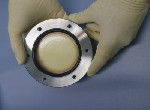 Description:
Description:
Testing method for determining carbon dioxide transmission rate of plastic films and hollow parts (other testing media and sample materials on request).
Result Unit:
Films:
Area related carbon dioxide permeability in cm3/(m2*d*bar);
Based on the thickness: permeability coefficient in cm3*mm/(m2*d*bar).
Hollow part related Films: area related oxygen permeability in cm3/(m2*d*bar) ;
Based on the thickness: permeability coefficient in cm3*mm/(m2*d*bar).Hollow part related oxygen permeability in cm3/(d*bar). Length related oxygen permeability in cm3/(m*d*bar) for tubes.
Declaration of cm3 at normal condition according to DIN 1343: volume of the gas at 273,15 K (0 °C) and 101325 Pa (1 atm).
Permeability in cm3/(d*bar).
Length related oxygen permeability in cm3/(m*d*bar) for tubes.
Declaration of cm3 at normal condition according to DIN 1343: volume of the gas at 273,15 K (0 °C) and 101325 Pa (1 atm).
(Related) Standards:
DIN 53380-1,
DIN 53380-2,
DIN 53380-3: Methods for the determination of gas permeability,
ISO 1399:1983: Elastomers, determination of gas permeability, test with constant volume,
ISO 2872:1977: Testing of rubber, determination of gas permeability, test with constant pressure.
Test method:
The test sample is mounted in a permeation cell to form the barrier between two chambers.
One chamber is flushed with carbon dioxide. The permeated gas is transported to the detector by a stream of carrier gas which flushes the second chamber. With hollow parts or tubes the carrier gas flushes the inner volume and the testing media surrounds it.
Detection limit:
Range of the norm: approx. 0,05 or 5000 cm3/(m2*d*bar) for films or 0,0005 to 50 cm3/(d*bar) for hollow parts. Please contact us for your differing requirements.
Required specimen:
For testing please send us a sheet of the approximate size of a sheet of paper (DIN A4, 210*297 mm). For non flat specimens, please contact us. Scope of the standard: 50 cm2 active area of the samples. The specimens shall be uniform in thickness, representative for the material and free of pinholes and folds. On request we measure your sample thickness according to DIN 53534. We recommend the measurement of three independent samples per test (a minimum number is not regulated by the standard). Our standard is to measure samples of 20 µm – 3 mm, others on request.
Required sample dimension:
We perform the preparation of the samples for you. For different test gases and types of samples we use different sized samples. If you want to conduct the cutting of the specimens yourself, please contact us for the required dimensions. For sensistive coating test, it makes sense sometimes to prepare first the support followed by the coating. Please inform us, if your samples tend to mechanical failure under applied pressure (of the test gas or the sealings).
Testing medium:
CO2 >99,5 %, dry.
Our testing cells are nearly universal in usage due to noncorrosive construction. Please contact us for special applications. The testing method is normally limited to substances or mixtures which contain substances with strongly skewing permeation rates.
Test conditions:
Temperature and gas pressure are not regulated by the standard. Mecadi’s possible testing temperatures:
Standard – 50 °C up to +150 °C, other temperatures on request.
Temperature tolerance possible with Mecadi equipment:
Better than +/- 0,1 °K (target: +/- 0,01 °K)
Experience shows that +/- 1°K tolerance leads to permeation rate scattering up to 20 %.
Mecadi’s possible testing pressures:
Standard: Until 100 bar, others on request.
Please contact us for information on special effects and requirements for the samples at high pressures. Also possible are temperature profiles (nonisothermic measurements) for the determination of morphology changes and the influence of media and pressure to polymer properties. Based on this method, Mecadi offers further examination to determine gas solubilities (sorption and desorption), diffusion coefficients and the measurement of break through times through barriers.
Furthermore, interactions between media and polymer can be investigated. Thus the predictions according resistance, physical and chemical reactions under process conditions can help in the selection process of materials. For safety reasons, Mecadi does not conduct the detection of the the permeate with a mercury filled u-tube (scope of the standard) but an electronic pressure transducer (constant volume). Please contact us if you need standard conform detection.
You find this article here as a PDF. We also do the test sample manufacture for you.

